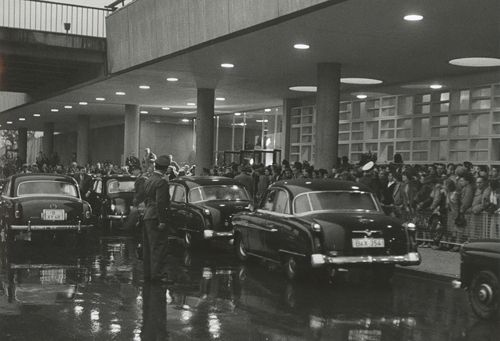Episode 3 / 1958: The Golden Key, Dialogue and the Defiance of a Front-Line City
West Berlin has a new building – The Berlin Film Festival opens with Gina Lollobrigida and Sidney Poitier

The Congress Hall is extremely popular with Berliners, and the special stamp issued by its own post office, like its beer terrace and steamer berth, add to their enthusiasm. Another favourite is the programme of chamber plays and dramatic readings. In June, for example, Klaus Kinski reads Paul Zech’s translation of Villon. The brilliant actor recites such lines as “Shards fall wherever my hands reach out…” and: “I’m already up to my teeth in shit” A minor scandal! Very well mannered, on the other hand, is the woman who appears in the horizontally striped dress in the jubilee photograph. On 9 September – not even a year has passed since the Congress Hall opened – the 250,000th visitor is given a bunch of gladioli and a free flight to Brussels to visit the World Exhibition.
Incidentally, the Hall now officially belongs to the “Berliners”. On 26 April, the chairman of the Benjamin Franklin Foundation (which commissioned the building) presents a Golden Key to Berlin’s new mayor Willy Brandt. Brandt again points out that the Hall is a place of free speech and the free exchange of ideas, and that it should remain so in the future. In his address, the Federal German President, Theodor Heuss, expresses his agreement with Brandt and argues that Franklin, a self-made man, was the first to promote the “American way of life”. A glance in the encyclopaedia reveals that Franklin, one of the USA’s Founding Fathers, was the son of a soap-boiler. The speeches, as reported in the newspapers, more and more seem rather clichéd: is the defiance of the front-line city beginning to fade?
This is certainly one way of interpreting the political statements at the opening of the 8th Berlin Film Festival, which in those days takes place in the early summer and is now holding its premiere in the Congress Hall. In his speech, Willy Brandt makes a plea for more open-mindedness. For the first time, a film from the USSR is invited. However, the invitation is declined. The countries of Eastern Europe are not represented in any case, because of the policy of excluding any countries that maintain diplomatic relations with the German Democratic Republic. A Soviet film will not be shown in West Berlin until 1974. American journalists report on the opening of the Berlinale: while it is pouring with rain outside, the champagne is flowing indoors. Stars from thirty-six countries arrive, headed by Gina Lollobrigida. Sidney Poitier is awarded a Silver Bear for his role in The Defiant Ones. (Wild Strawberries wins a Golden Bear.) Walt Disney poses for photographs in front of the Hall.
As for the hopes raised by the Berlinale, some events of the day tend to weaken rather than strengthen them. Khrushchev's ultimatum gives the Western powers six months to leave Berlin. In the Federal Republic, the debate on whether the West German armed forces should be equipped with nuclear weapons is in full swing. Appropriately enough, the symbol of World Exhibition 58 in Brussels (attended by the 250,000th visitor to the Congress Hall) is the Atomium …
Axel Besteher-Hegenbart
www.klaus-kinski.de
New York Times 27.4.58
Chicago Daily Tribune 27.4.58
Berliner Morgenpost 27.4.58
www.berlinale.de
Los Angeles Times 2.7.58